Key takeaways:
- Follow-ups are essential for transforming short-term encounters into lasting relationships and fostering a sense of belonging and support among community members.
- Timely and personalized communication strengthens relationships, fosters feedback, and can lead to unexpected opportunities for collaboration.
- Effective follow-up strategies include clarity in messaging, active listening, and expressing gratitude to enhance engagement and connection.
- Evaluating follow-up effectiveness through feedback and data analysis helps refine communication strategies and strengthen future interactions.
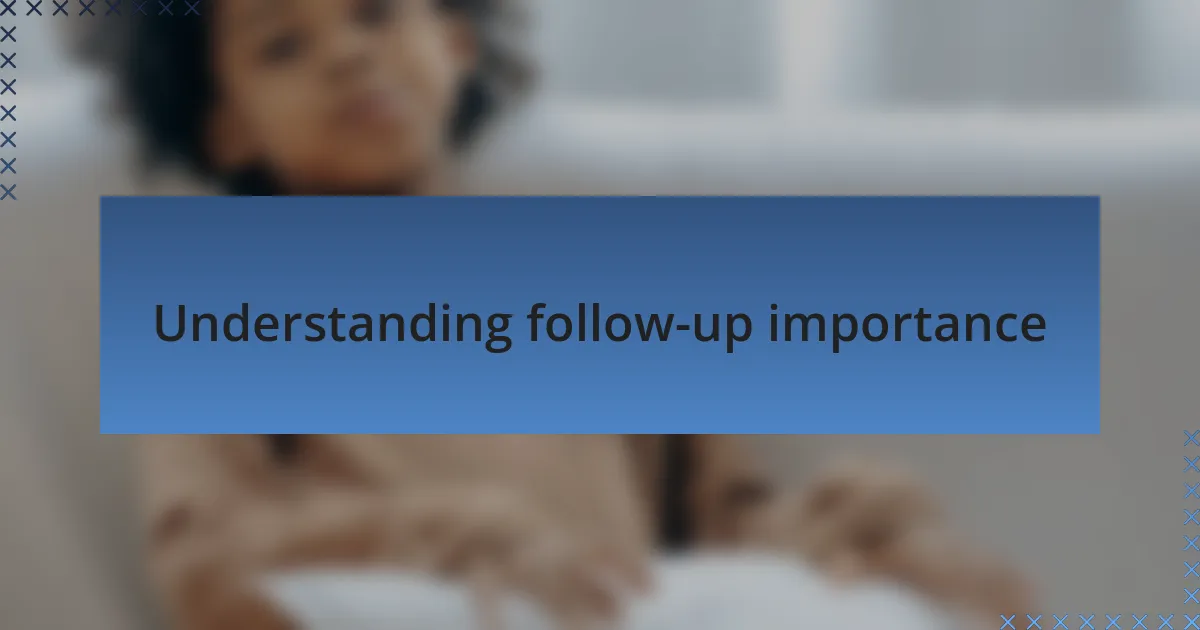
Understanding follow-up importance
Following up after events is crucial, as it allows us to reinforce connections made during those interactions. I remember after a charity fundraiser, I took the time to send personalized messages to attendees. The responses were heartwarming; people appreciated the gesture and felt valued, which is vital in nurturing ongoing support.
Have you ever considered how a simple follow-up can transform a fleeting encounter into a lasting relationship? I’ve found that reaching out not only shows appreciation but also opens doors for future collaboration. One time, a brief thank-you email led to a volunteer rejoining our team years later, fueled by that initial connection.
Moreover, consistent follow-ups can help solidify trust within the community we serve. I vividly recall a family we assisted; after I checked in with them a few weeks post-event, they expressed that our ongoing support made them feel integrated and not alone. This experience reminded me that follow-ups are more than just a formality—they foster a deeper sense of belonging and importance for every individual involved.
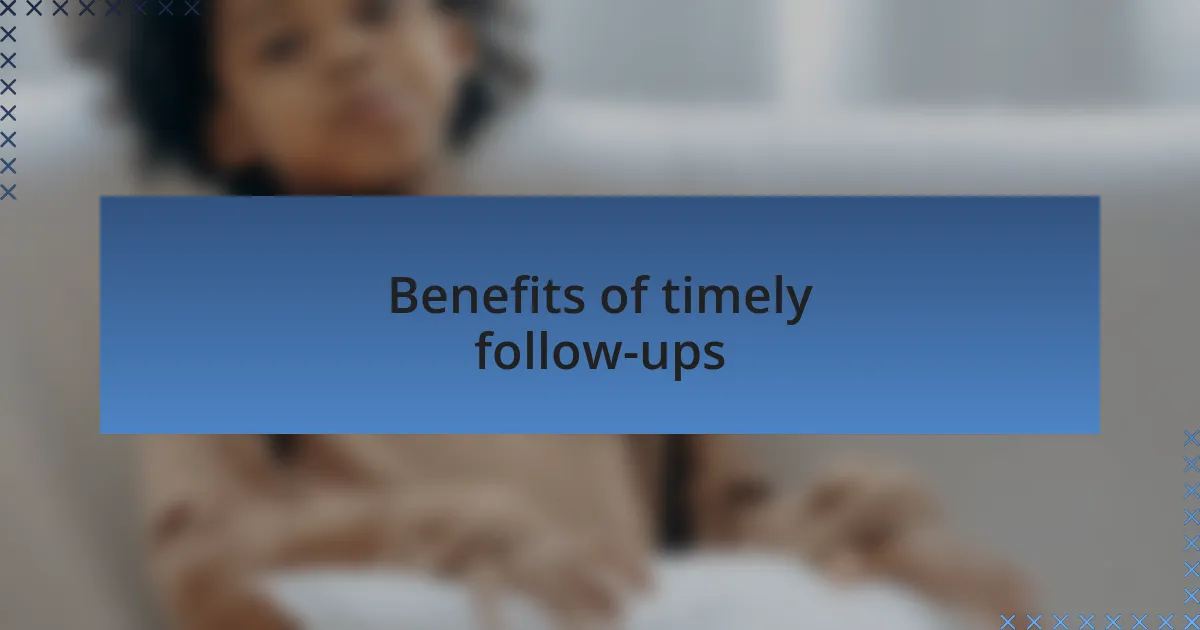
Benefits of timely follow-ups
Timely follow-ups do wonders for strengthening relationships. I recall a time when I reached out to a local business after they donated to our cause. Their response was overwhelmingly positive; they felt appreciated and recognized, which not only reinforced their support but made them enthusiastic about future contributions. Isn’t it incredible how a simple act of acknowledgment can motivate someone to remain involved?
Another benefit I’ve observed is the opportunity for feedback. After an event, I often ask participants what they enjoyed or what could be improved. Recently, I did this at a community gathering, and one parent shared that they loved a particular activity but also suggested adding more educational workshops. Their feedback was invaluable; it not only helped us refine future events but made them feel heard and engaged. How much more effective can our programs be when we listen attentively to our supporters’ ideas?
Lastly, timely follow-ups can lead to unexpected opportunities. After one outreach event, I followed up with a participant who expressed interest in volunteer roles. That casual conversation blossomed into a partnership with her organization, leading to more resources and outreach. Reflecting on this, it strikes me how a little persistence can yield pathways we didn’t initially consider. Isn’t it worth taking the time?
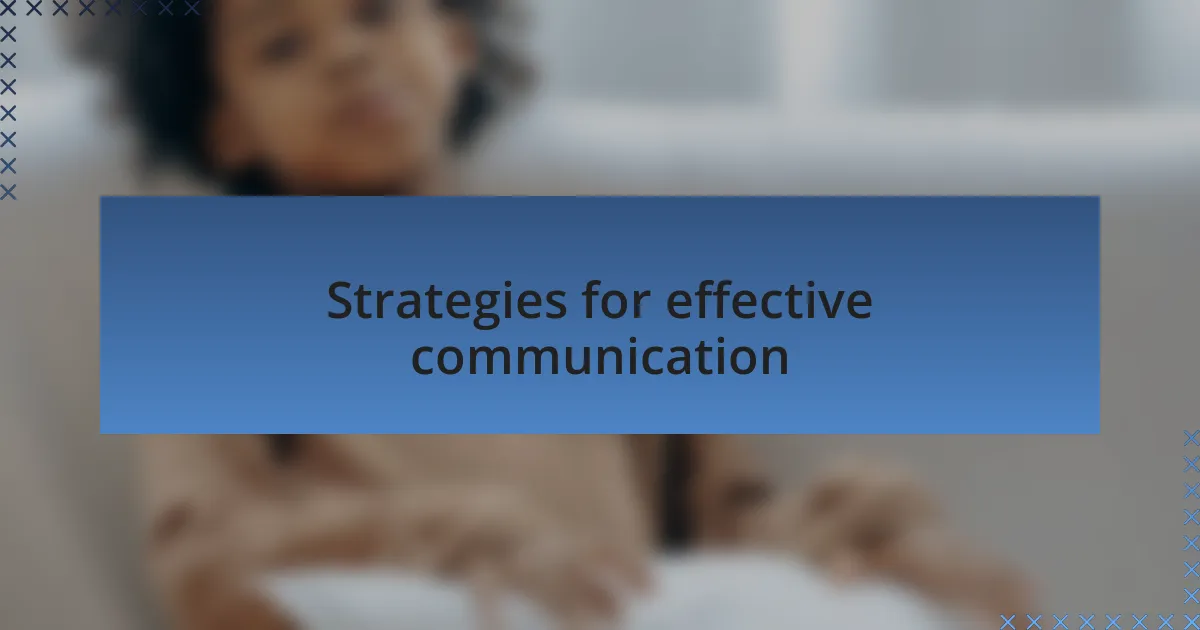
Strategies for effective communication
Effective communication starts with clarity. When I communicate with supporters or partners, I focus on being straightforward about our mission and needs. For example, during a recent fundraising event, I shared specific goals and how contributions made a tangible difference. This not only simplified the message but also helped attendees feel more connected to our cause. How much clearer can we be to foster engagement?
Another strategy I’ve found valuable is personalization. I often tailor my follow-up messages to reflect our conversations, mentioning specific points that stood out. One time, I reached out to a donor and referenced their passion for children’s education. Sharing updates related to that interest made them feel more connected. Isn’t it amazing how a personalized touch can rekindle enthusiasm?
Lastly, I’ve learned the power of active listening in communication. While following up with a volunteer, I made it a point to discuss their experiences and suggestions. They shared some insightful ideas that I hadn’t considered before, leading to enhancements in our outreach programs. Isn’t it fascinating how truly hearing someone can transform our approach and strengthen partnerships?
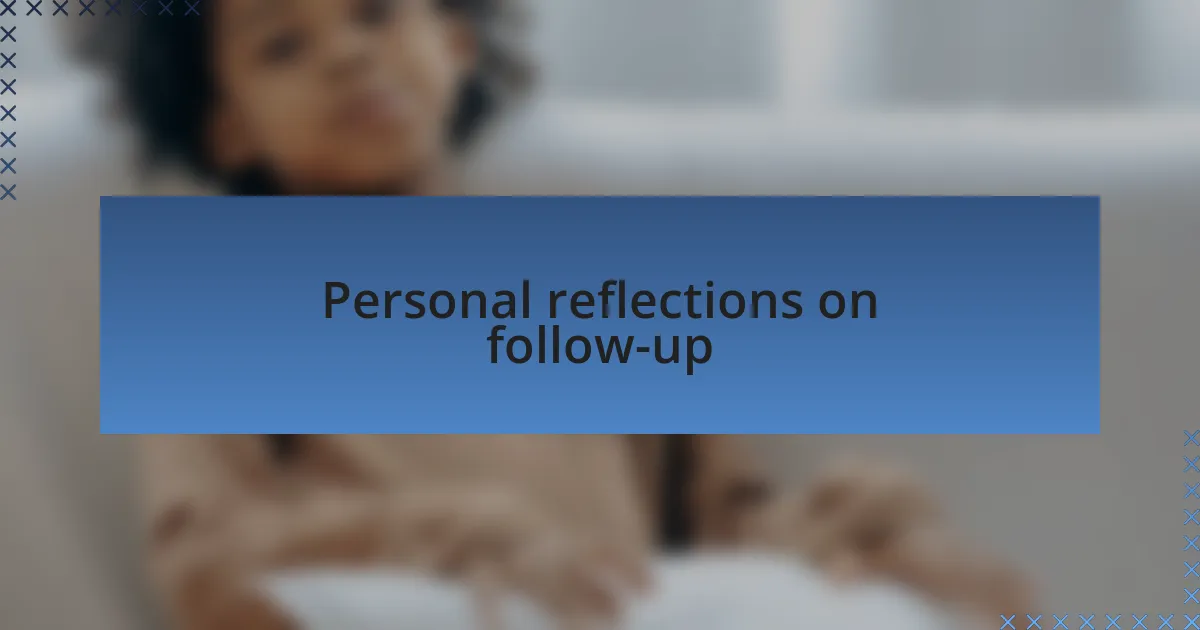
Personal reflections on follow-up
When I think about follow-up, I can’t help but recall a time when I reached out to an attendee after a charity gala. I sent a heartfelt message thanking them for their support and inviting them to share their thoughts about the evening. To my surprise, they replied with such enthusiasm, expressing how inspired they felt to be part of our mission. It was in that moment I realized how follow-up is more than just a task; it’s an opportunity to nurture a relationship.
Reflecting on my own experiences, I’ve found that the effectiveness of follow-up often hinges on the timing. I once waited a bit too long to check in with a potential sponsor, thinking they needed time to consider. By the time I reached out, they had already committed elsewhere. I learned that a prompt, thoughtful follow-up can keep conversations alive and show that we genuinely care. Have you ever missed an opportunity simply by not following up in time?
Another insight I’ve gained is the importance of expressing gratitude in every follow-up. I remember sending a simple thank-you note to a volunteer after a community outreach event, and they responded with such warmth, sharing how valued they felt. That small gesture reinforced my belief that follow-ups are not merely transactional; they can encourage a deeper sense of belonging and investment in our cause. Isn’t it intriguing how something as simple as gratitude can significantly impact our connections?
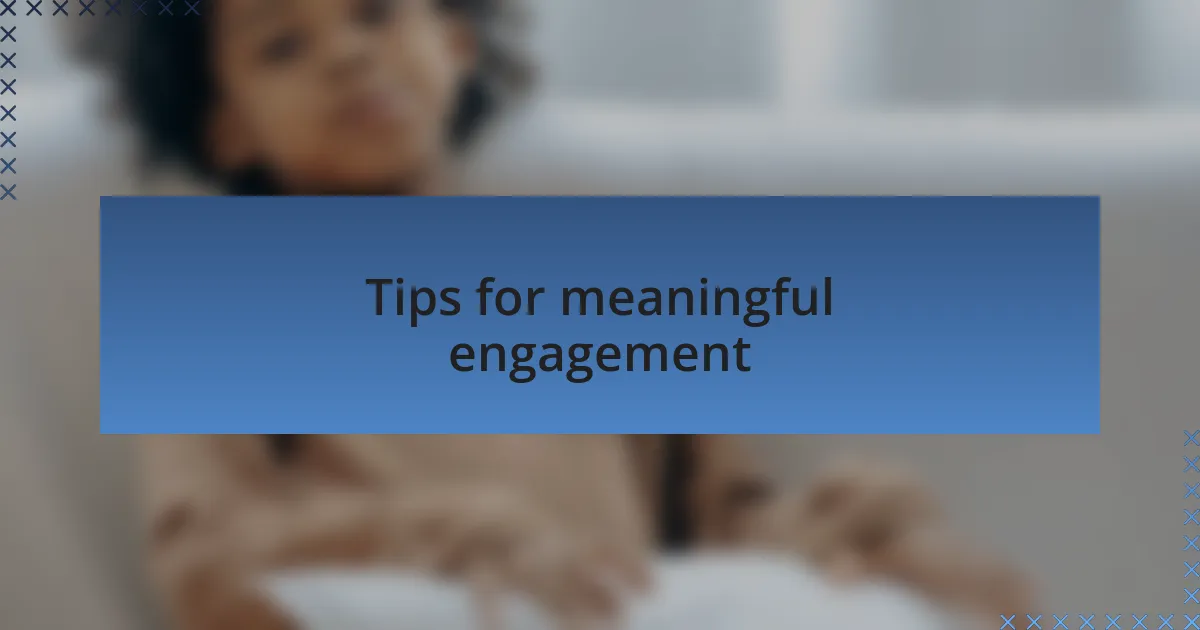
Tips for meaningful engagement
When I reflect on my own experiences, one effective strategy for meaningful engagement is to personalize your communication. For instance, after a fundraising event, I took the time to recall specific interactions I had with attendees, mentioning something unique about each person in my messages. Not only did this make my follow-up feel more genuine, but it also showed that I truly valued their individual contributions. How often do we overlook the power of personal touch in our communications?
Another tip I’ve found valuable is to create opportunities for continued dialogue. After an event, I once posted a question on social media, inviting participants to share their favorite moments. The response was overwhelming, with people sharing their stories and even suggesting ideas for future events. This kind of engagement fosters a community feeling and makes everyone feel their voice matters. Isn’t it amazing how simple prompts can spark such wonderful conversations?
Lastly, don’t be afraid to share updates and successes in your follow-ups. I remember sharing the positive outcomes of a recent project with donors and volunteers who had played a part in it. Their responses were filled with pride and excitement, as they understood the real impact of their contributions. This not only reinforced their connection to our mission but also encouraged continued support. How can we showcase the impact of collaboration to inspire further engagement?
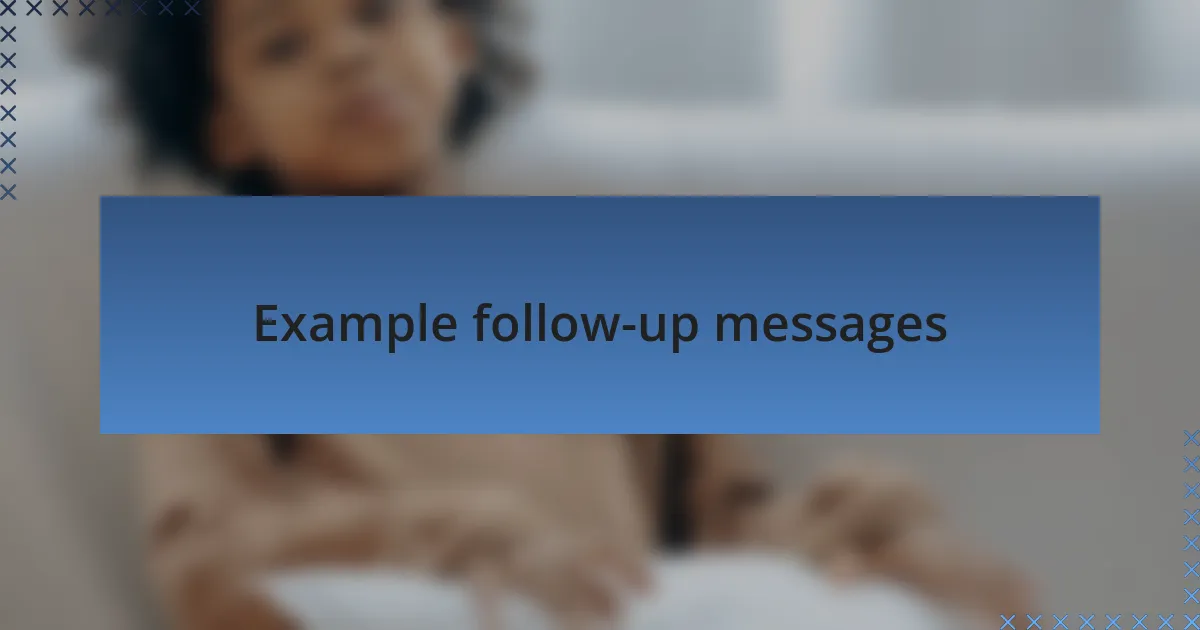
Example follow-up messages
A simple yet effective follow-up message I’ve used after events is expressing sincere gratitude. For example, I once sent an email saying, “I just wanted to take a moment to thank you for attending our charity gala. Your presence made a difference, and I hope you enjoyed the evening as much as I did.” This approach not only acknowledges their participation but also invites a personal connection. Have you ever noticed how a heartfelt thank-you can warm hearts and encourage future involvement?
Another message I found impactful was sharing a story that highlights the event’s success. I remember crafting a message like, “Because of your help at our recent drive, we were able to deliver 150 backpacks filled with school supplies to children in need!” It’s incredible how sharing tangible results can evoke pride and a sense of belonging in supporters. What are some stories or outcomes that would resonate with your audience?
Lastly, I often invite feedback in my follow-up messages, which has proven to strengthen relationships. In one instance, I wrote, “We value your thoughts! If you have any suggestions for our next event or potential collaborations, I’d love to hear them.” This not only creates an avenue for dialogue but also empowers supporters to feel part of the cause. Isn’t it essential to make them feel their opinions count?
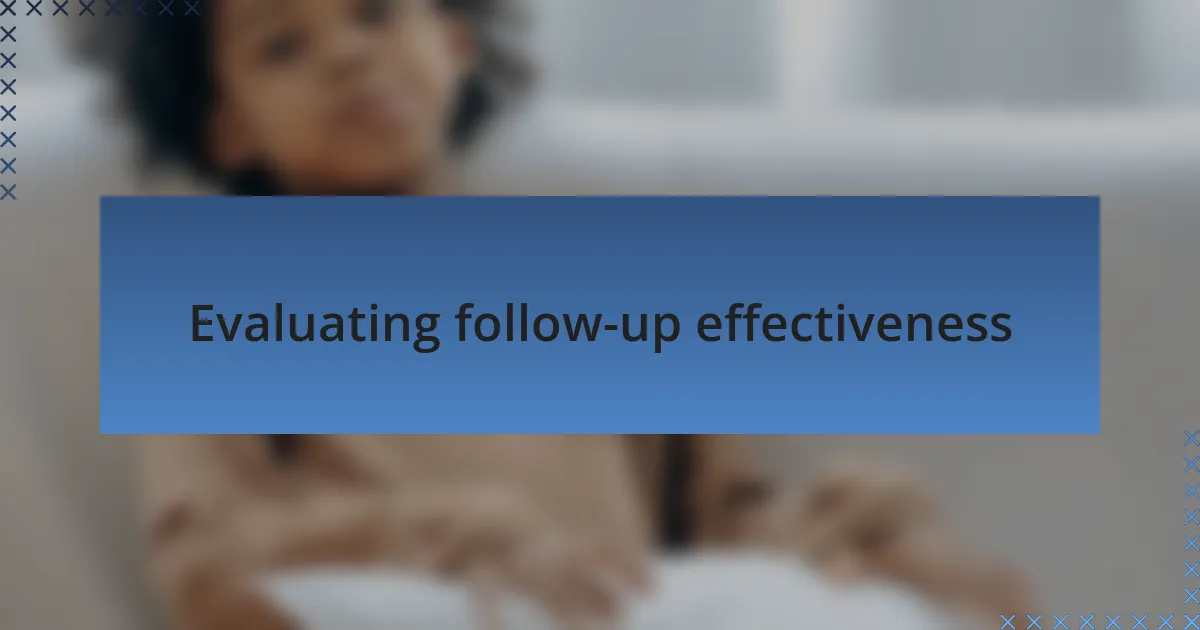
Evaluating follow-up effectiveness
Evaluating the effectiveness of follow-up messages is crucial to understanding their impact. I recall an instance where I asked a few supporters if they felt personally connected to our mission after receiving a follow-up email. The responses varied, but those who indicated they felt a deeper connection were much more likely to participate in future events. Doesn’t it make sense to gather this kind of feedback to refine our approach?
In analyzing the data from our follow-up efforts, I realized that open rates and response rates can tell us which messages resonate the most. For example, I compared two messages: one focused solely on gratitude and the other shared detailed outcomes of our efforts. The latter garnered significantly more engagement. It made me think, how can we leverage these insights to craft even more compelling messages in the future?
One approach I’ve found effective is to segment our audience and tailor follow-up messages accordingly. I had success when I sent personalized updates to a group of supporters who had previously volunteered with us. The feedback was overwhelmingly positive, and many mentioned feeling valued and more likely to engage again. How can we better understand our supporters’ preferences to create more meaningful connections through follow-ups?